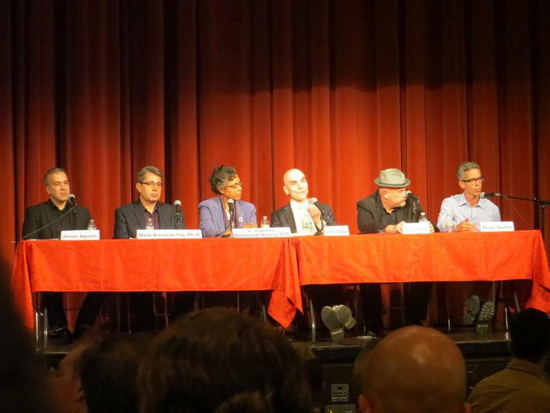

In recent months I've had the honor of being part of the Medius Working Group, described as "a disparate group of activists who seek to honor their late friend Spencer Cox, an activist keenly aware of the unique needs and concerns of AIDS-generation survivors." Last week in New York we held a large community forum titled "Is This My Beautiful Life? Perspectives From Survivors of the AIDS Generation."
The panel discussion that got the night going was remarkable, and a video of the event will be posted online soon. My fellow panelists (pictured above, from left to right) included Jesus Aguais, Dr. Mark Brennan-Ing, Dr. L. Jeannine Bookhardt-Murray, Jim Eigo and Joe Jervis. The evening was hosted by the Tony Award-winning star of Angels in America Stephen Spinella and moderated by Dr. Perry N. Halkitis.
Here are my opening remarks:
This all started for many of us on that Tuesday morning in December. Three days before, Spencer was making a seemingly strong recovery, and we thought he was out of the woods. Then everything went to shit, and we all rushed to that hospital none of us had ever heard of at the very tip of Manhattan. Spencer Cox was one of the youngest of ACT UP's alumni, and his death at only 44 sent a shockwave to all of us, not just the current and former activists but our generation, our AIDS generation, men and women, positive and negative.
A huge and largely healthy discussion ensued, with long phone calls, dinners with friends we hadn't seen in recent years, Facebook threads, blog postings and even a long article in a Sunday New York Times. A kind of bubble had burst. What did this say about us? How are we doing now? How are we treating each other? Is there a community that even cares about us?
The memorial was beautiful. It was funny, campy, moving, a little trashy at times, tearful and even sexy (thank you, David Drake). But most of all it felt communal, in a way many of us miss dearly. After a short break some of Spencer's friends formed the Medius Working Group to see if there were ways to highlight the issues he often raised in his final years. TAG is working with Dr. Judith Rabkin at Columbia University on a possible study, hoping to survey a couple hundred former AIDS activists in an attempt to quantify how we're doing. Alan Klein has organized some ACT UP alumni that hope to pull off a series of more regular reunions structured as social events.
And tonight is for some much-needed venting. For purists who always want narrowly defined discussion points with clearly defined goals, tonight is probably not your night. It's too early in this process to say assuredly "these are our issues."
I'm sure a lot of the discussion will be about our challenges and grievances. I know I've got some to share. As I said at Spencer's memorial, many of us in some way have unprocessed grief, or guilt, or an overwhelming sense of abandonment from a gay community that turned its back on us and increasingly stigmatizes us, all in an attempt to pretend that AIDS isn't its problem anymore. Many of us see our national gay rights groups and our gay foundations and big gay money focused entirely on the feel-good battle for marriage equality. As worthy as that battle is, aren't we shooting ourselves in the foot with this singular focus? Silence may no longer equal death on the scale it once did, but it's certainly feeding an alarming rise of HIV infections in young gay men, especially in apparently easy-to-ignore young gay men of color. Where are they in these happy marriage pictures?
So, yes, let's discuss these feelings of abandonment, or unprocessed grief, or loneliness, or addiction. But let's also recognize our strengths, what we've overcome, our resilience. I'm fascinated by the brilliant work of Dr. Ron Stall from the University of Pittsburgh, who has been studying the health of gay men for many years. He writes a lot about syndemics, a group of epidemics interacting synergistically to lower the overall health profile of a population. So he studies the burdens and fallouts a lot, including the self-loathing we were taught as kids, or living through the plague years. But what amazes him the most is our resilience through all this. It's the glass-half-full metaphor. Yes, let's examine the empty half and the reasons behind it, but let's also acknowledge our pool of strengths. Where does that resilience come from, and can we build on it?
Thanks for turning out tonight. I'm really honored to be on this panel and hope the conversation we start here with all of you will continue in the months ahead.
